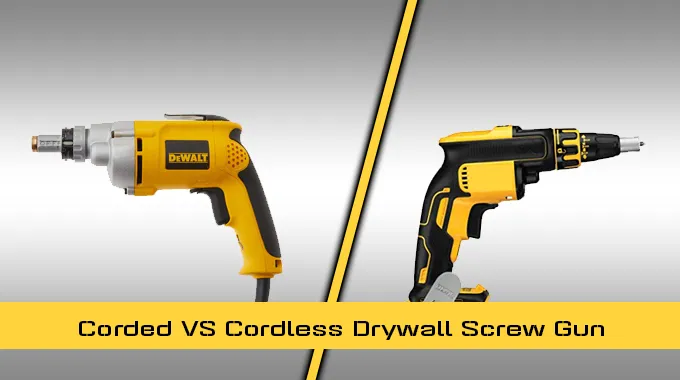Last Updated on March 21, 2023
If you’re thinking of tackling drywall projects, it may be time to invest in a screw gun. But before taking the plunge, consider whether you’d benefit more from corded or cordless.
One significant difference between the two is that corded models tend to be more powerful, for instance, excellent for jobs that require a lot of torque or sustained use. And cordless versions offer unparalleled mobility around the worksite. It allows users to tackle challenging tasks from different angles with complete freedom.
Whether you’re a professional or DIY-er, when choosing the right drywall screw gun for your project, there’s more than meets the eye. From power source and speed/torque to accessibility and maintenance needs, ensure you keep an eye out for all these factors before making this key selection.
Let’s dive into all the details so you can make a smart acquisition decision.
Corded Vs Cordless Drywall Screw Gun: What Are the Differences?
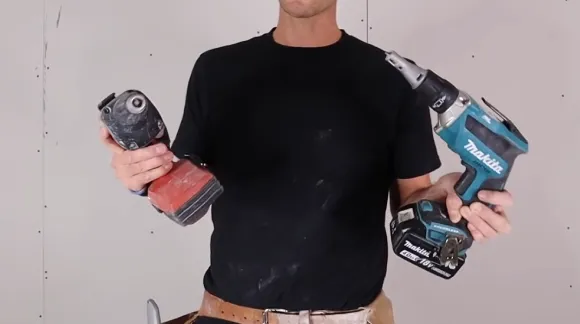
Getting the right tool for a big home improvement task like hanging drywall is key to achieving professional results. A Drywall Screw Gun can make it much easier, but selecting between corded or cordless models requires weighing some important factors to get what you need!
Power Source
Corded screw guns are powered by a direct connection to an outlet, meaning they can be used in areas where battery-powered tools may not have access to power. This makes them the ideal tool for larger projects, as there is no need to worry about the battery running out of power.
Cordless screw guns are powered by rechargeable batteries. This means they are much more portable than corded models, allowing for greater mobility and flexibility when tackling projects. This comes at the cost of having a slightly lower maximum speed setting due to limitations created by the battery size and power output.
Speed and Torque
Corded models generally offer higher speeds (up to 5500 RPMs) than cordless models (up to 4500 RPMs) due to their direct connection to an outlet or generator. As such, they may be better suited for applications requiring high speed with minimal effort.
Conversely, cordless screw guns may not be able to reach higher speeds than their corded counterparts due to their reliance on batteries. But they can still provide adequate speed settings depending on the project requirements.
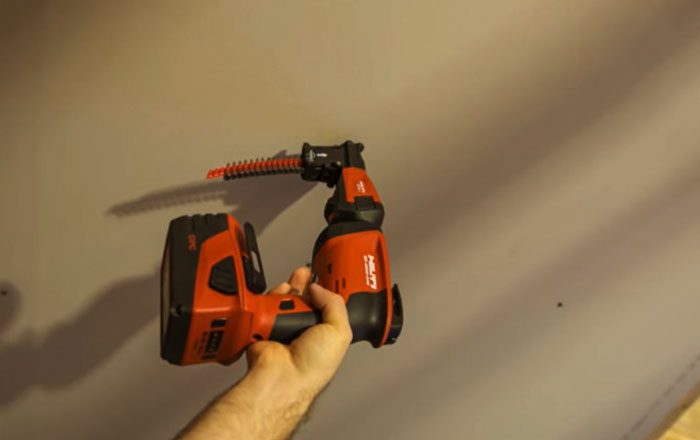
Furthermore, because of their direct connection to a power source, corded models typically allow higher torque settings than those achievable with a cordless model. Hence, they are ideal for projects requiring more power or leverage with less effort from the user, such as driving screws into metal studs or heavy gauge steel plates.
Weight and Size
Corded drywall screw guns are generally heavier than their cordless counterparts since they require an external power source, such as an extension cord. This added weight can range from a few pounds to several, depending on the model type and features included.
And many corded models may feature additional components, such as a dust collection system or LED lights, which further add to the overall weight of the tool.
Cordless drywall screw guns do not require an external power source and instead rely on a battery pack for operation, meaning they often have a much lighter design than their corded counterparts.
This makes them highly maneuverable and easy to use in tight spaces where cords would otherwise be difficult to manage safely. Furthermore, many models include additional ergonomic features to help reduce fatigue while working in challenging positions over long periods.
Accessibility and Portability
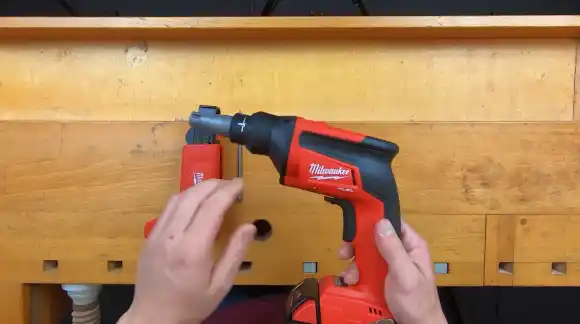
For corded models, their reliance on an external power source and corded drywall screw guns are limited in terms of accessibility and portability. For example, if you need to work on multiple job sites, the extra weight from cords could be cumbersome for users moving around frequently with their tools.
And if access to an electrical outlet is not available at a particular job location, this could severely limit the usability of these tools in that situation.
In contrast to corded models, cordless drywall screw guns are highly accessible since they don’t require external power sources like cords or outlets. This makes them much easier for users who need more flexibility when traveling between multiple job sites or working in locations with limited access to electrical outlets or other power sources.
With no cords to restrict movement, cordless screw guns provide an innovative level of maneuverability that makes it easy to access awkward or hard-to-reach places.
Application Sectors
Corded models offer greater speed and torque for drilling into dense materials such as hardwood or concrete, making them a good choice for heavier-duty projects that require additional power. Their main disadvantage is the restriction of movement caused by the cable. Which can be a nuisance in larger jobs or those requiring work in different areas.
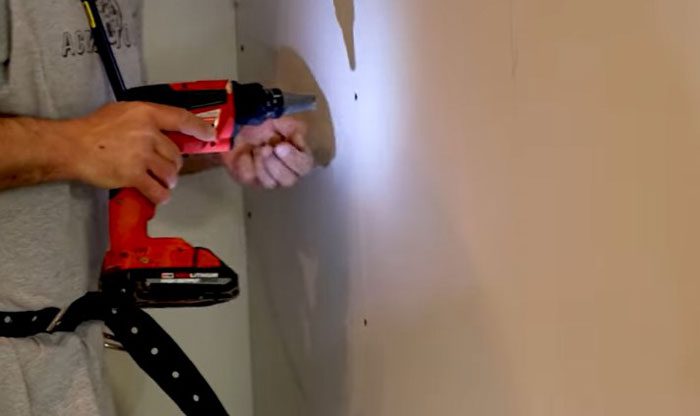
Cordless screw guns are better suited for light-duty applications due to their slower driving speeds. They also provide greater portability than corded models, allowing users to take them to different places without worrying about cables getting in the way.
They are generally not as powerful as corded models and thus may struggle with tougher tasks like drilling into hard surfaces.
Maintenance Requirements
Corded models are relatively low maintenance since they do not require any charging or battery replacement. As long as there is access to an electrical outlet, they will remain functional. However, this also means that activity range with these tools is limited by the length of the cable – so it’s essential to keep this in mind when selecting a model.
On the other hand, cordless screw guns require regular charging after each use or risk running out of juice while working on a project. So if you plan on using one over an extended period, it’s best to bring extra batteries or plan accordingly when factoring job duration times into your schedule.
And it’s important to ensure that all batteries used are compatible with your specific model, as some brands may only utilize certain types of battery cells for safety reasons (i.e., lithium-ion vs. nickel-cadmium).
Cost Considerations
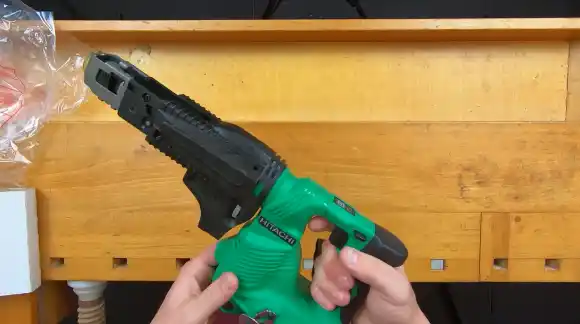
Corded models of drywall screw guns tend to have a lower upfront cost as all necessary parts are generally included in the box, which is convenient for users who are just starting. And longer extension cords can allow for increased flexibility since many corded models come with shorter cords that may limit their range and mobility.
In contrast, cordless drywall screw guns may be more expensive initially, but this cost can be offset over time by being able to recharge battery packs instead of having to replace them often. Furthermore, the lack of cords provides greater freedom of movement and improved portability compared to their corded counterparts.
The following are some examples of drywall screw guns:
Corded 6.0-Amp Drywall Screw Gun
This drywall screw gun is a heavy-duty power tool designed for quick and efficient installation of drywall, offering precision and control over even the tightest spaces. It features an adjustable clutch for maximum torque control and an ergonomic handle for added comfort and strain relief.
The motor has a speed range from 0 to 4500 RPM, allowing you to adjust your speed depending on the material you are working with. Its durable steel construction ensures this screw gun will last through multiple jobs, making it an excellent investment for professional contractors and DIYers.
Corded Variable Speed Drywall Screw Gun
It is ideal for tackling any job, from minor repairs to complex projects, with ease and efficiency. It features two different heads that can be switched quickly to adapt to the material you’re working with, ranging from sheetrock to plasterboard or composite materials.
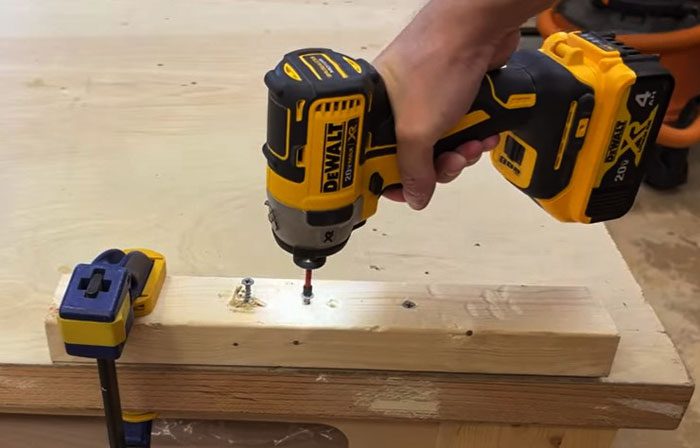
Also, you can adjust the speed from 0 to 4500 RPMs based on the thickness of the material and the desired result with this screw gun. The depth stop lets you drive screws in multiple layers of material at the same depth consistently.
Cordless Auto-Feed Screwdriver
Don’t worry about cords getting tangled in your workspace. This lightweight yet powerful tool is ideal for easily tackling large jobs. Equipped with an intuitive auto-feed system, it will automatically advance screws into place without manual adjustment each time.
It saves effort and time while delivering adjustable speeds up to 3500 RPM so that you can customize the perfect amount of power needed for any application. By choosing this cordless screwdriver, you will get results faster and maintain total control throughout your project.
Brushless Cordless Drywall Screwdriver
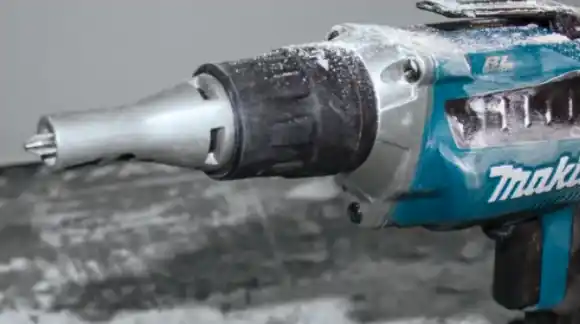
This cordless drywall screwdriver combines convenience and performance in one device, allowing you to get whatever job was done quickly, no matter where you go. This highly efficient tool runs on a powerful brushless motor that delivers up to 4000 RPMs, so you can quickly drive through even thick layers of material while still achieving precise results every time.
Professionals who work in construction and remodeling prefer this brushless cordless drywall screwdriver. Its lightweight body makes it a breeze for lengthy projects, while its dual LED headlights ensure you can see inside walls or tight spaces no matter how dark they are.
Where Should You Not Use Drywall Screw Guns?
You should not use a drywall screw gun in areas that need to be extremely precise, such as when installing door frames or baseboard trim. Drywall screws that are too long can damage the wood and cause the door frame or baseboard to be installed incorrectly.
And it is not recommended to use a drywall screw gun on any material other than drywall except for particular models.
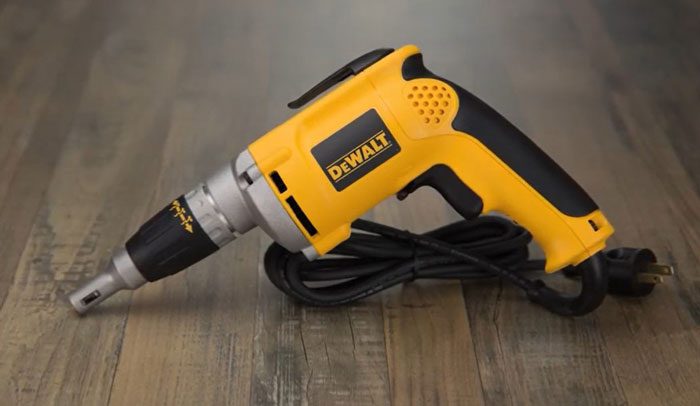
Which Type of Drywall Screw Gun Is Better For Longer Projects?
For longer projects, a corded drywall screw gun is generally recommended. This type of drill has more consistent power output since it relies on being plugged into an electrical outlet, making it well-suited for long tasks like putting up sheets of drywall. Its higher torque capabilities make it ideal for heavier-duty applications.
How Long Do the Batteries Last In a Cordless Drywall Screw Gun?
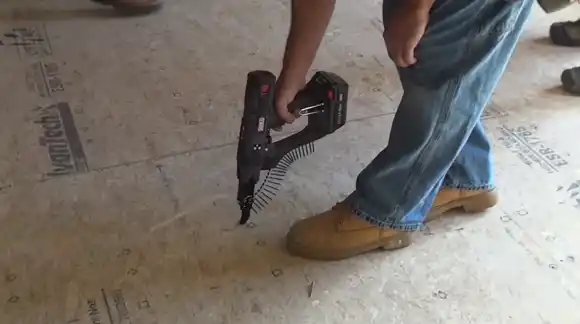
The amount of time your battery will last before needing to be recharged or replaced depends mainly on the quality and capacity of the battery, as well as how much you are using the tool.
Generally speaking, high-quality batteries should provide enough runtime (one or two days) for most shorter jobs without needing to be recharged between uses.
Which Is Better: Drywall Screw Gun Corded vs. Cordless?
It depends on what you’re looking for in your drywall screw gun. If you need a powerful tool and will mainly be working within reach of an electrical outlet, then the extra torque that comes from using a corded model may be worth it.
And if you need maximum portability or frequently work on sites without access to power outlets, then a battery-powered version might be more suitable. Ultimately, both types of drywall screw guns have their place in any DIYer’s toolbox, depending on the job.
By carefully considering each factor outlined above in this blog post, we hope you understand both options better to make an informed decision when selecting your next drywall screw gun.
